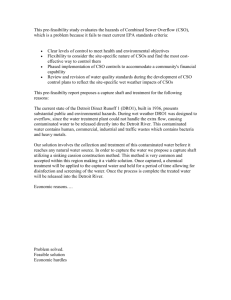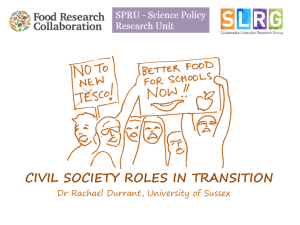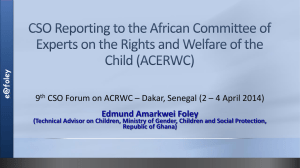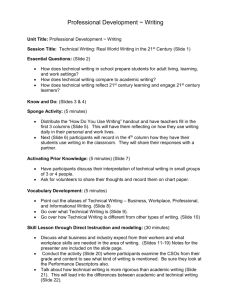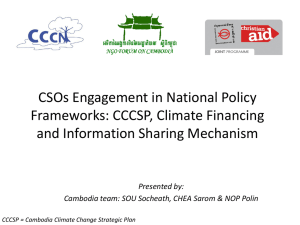UNDP-CH03 Annexes - United Nations Development Programme
advertisement
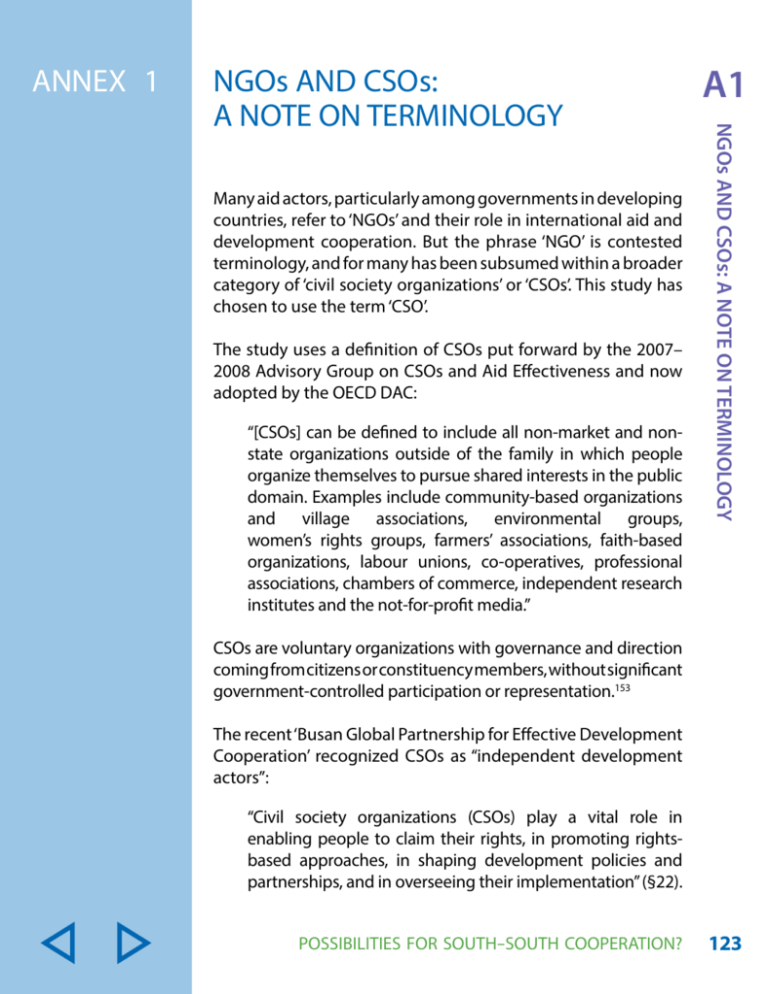
ANNEX 1 Many aid actors, particularly among governments in developing countries, refer to ‘NGOs’ and their role in international aid and development cooperation. But the phrase ‘NGO’ is contested terminology, and for many has been subsumed within a broader category of ‘civil society organizations’ or ‘CSOs’. This study has chosen to use the term ‘CSO’. The study uses a definition of CSOs put forward by the 2007– 2008 Advisory Group on CSOs and Aid Effectiveness and now adopted by the OECD DAC: “[CSOs] can be defined to include all non-market and nonstate organizations outside of the family in which people organize themselves to pursue shared interests in the public domain. Examples include community-based organizations and village associations, environmental groups, women’s rights groups, farmers’ associations, faith-based organizations, labour unions, co-operatives, professional associations, chambers of commerce, independent research institutes and the not-for-profit media.” A1 NGOs AND CSOs: A NOTE ON TERMINOLOGY NGOs AND CSOs: A NOTE ON TERMINOLOGY CSOs are voluntary organizations with governance and direction coming from citizens or constituency members, without significant government-controlled participation or representation.153 The recent ‘Busan Global Partnership for Effective Development Cooperation’ recognized CSOs as “independent development actors”: “Civil society organizations (CSOs) play a vital role in enabling people to claim their rights, in promoting rights‐ based approaches, in shaping development policies and partnerships, and in overseeing their implementation” (§22). POSSIBILITIES FOR SOUTH-SOUTH COOPERATION? 123 There are many types of CSOs involved in delivering aid, including faith-based groups, trade unions, professional associations, internationally affiliated organizations with branches in many different countries etc. ‘NGO’is sometimes used interchangeably with ‘CSO’, but NGOs should be properly understood as a subset of CSOs involved in development cooperation, albeit often one with no clear boundaries. Constituency-based organizations, such as trade unions or professional associations, for example, often do not self-identify as NGOs, but rather as CSOs. In the USA, the term generally used to refer to US CSOs involved in international development and humanitarian assistance is Private Voluntary Organizations (PVOs). According to USAID, a PVO is “a tax exempt, nonprofit organization that solicits and receives case contributions from the general public and conducts or anticipates conducting international programme activities consistent with US Foreign Policy objectives.”154 In the USA, the category of CSO sometimes includes for-profit organizations. International NGOs (INGOs) can be seen as a distinct category among non-state actors, which have been very prominent in development cooperation during the past decade. They constitute a subset of NGOs in which coalitions or families of NGOs, based in various donor and developing countries, have formally associated in an international or global governance structure.155 These international structures coordinate their ‘NGO family’ programming at the global level. This characteristic changes the INGO’s relationship with a given donor or public in an individual donor country as these organizations develop, finance and promote programmes across donor countries. Some well-known examples are World Vision International, CARE International and Save the Children International. Rather than delve into a debate on the pros and cons of this terminology, which is a reflection of the diversity of nongovernmental actors (many of whom are not involved in aid delivery), this study has chosen to use ‘CSOs’ as the most inclusive concept. 124 WORKING WITH CIVIL SOCIETY IN FOREIGN AID One final note: while not-for-profit universities, research institutes and ‘think tanks’ can be included within a definition of CSOs, these bodies have been excluded from this study, as their relationship to the delivery of aid was covered in another study commissioned by UNDP China. POSSIBILITIES FOR SOUTH-SOUTH COOPERATION? A1 NGOs AND CSOs: A NOTE ON TERMINOLOGY CSOs include a diverse set of organizations, ranging from small, informal, community-based organizations to the large, high-profile, INGOs working through local partners across the developing world. Their governance structures are equally varied, a function of their mandate and constituency. However, all share a common characteristic: CSOs, by their very nature, are independent of direct government control and management. 125 126 WORKING WITH CIVIL SOCIETY IN FOREIGN AID ANNEX 2 Based on international experience of laws and regulations affecting CSOs in DAC donor countries, a number of good practices have been identified that enable CSOs to be effective in fulfilling their roles as development actors.169 Those considering drafting new or revised laws and regulations for CSOs might consider the following elements: 1. Acquisition of legal status as voluntary, based on objective criteria, and not a prerequisite for the exercise of rights to expression, peaceful assembly and association. 2. Civic organization laws written, clearly defined and administered so that it is quick, easy and inexpensive to establish and maintain a civil organization as a legal entity in perpetuity, with a defined and reasonable time limit for decisions and written justification for denial of status, subject to appeal. 3. All acts and decisions affecting formal civil organizations as subject to appropriate and fair administrative and independent judicial review. 4. Laws and regulations as excluding or simplifying reporting procedures for small, provincial, community-based organizations and alliances. 5. Laws and regulations as sustaining effective processes and instruments that ensure social participation in public policy development, implementation and evaluation. A2 AN ENABLING LEGAL AND REGULATORY ENVIRONMENT FOR CSOs AN ENABLING LEGAL AND REGULATORY ENVIRONMENT FOR CSOs 6. Laws and regulations as providing guarantees for civil organizations with the right to speak freely on all matters of public significance, including existing or proposed legislation, state actions and policies, and the right to non-partisan criticism of state officials and candidates for public office. POSSIBILITIES FOR SOUTH-SOUTH COOPERATION? 127 7. Civic organizations as facilitated to carry out public policy activities such as education, research, advocacy and the publication of position papers. 8. Laws, regulations and policies as providing for mechanisms and processes that allow for less bureaucratized, consistent, transparent and more efficient access to public funds, with accountability on the part of both government and CSOs. 9. Laws, regulations and policies as facilitating civic organizations to engage in any legitimate fundraising activity, with voluntary self-regulatory mechanisms for accountability, but public disclosure of the ways in which fund are raised and used, including fundraising expenses. 10. Laws, regulations and policies as creating an enabling tax regime that stimulates civic participation through tax incentives for donations from individuals and the private sector. 11. A formal civic organization that is properly established in one country would generally be allowed to receive cash or in-kind donations, transfers or loans from outside the country so long as all generally applicable foreign exchange and customs laws are satisfied. Such laws should not impose confiscatory taxes or unfair rates of exchange. 12. CSO laws and regulations as administered by an independent multi-stakeholder body. A government agency mandated to determine whether an organization qualifies for ‘public benefit’ or ‘charitable’ status, and to administer laws and regulations governing CSOs, might function as an independent commission with mixed stakeholder governance. It is appropriate for the regulatory burdens on civic organizations to be commensurate with the benefits they obtain from the State. 128 WORKING WITH CIVIL SOCIETY IN FOREIGN AID ANNEX 3 While there are many national and sectoral accountability frameworks governing CSO development practices,156 globally there are three prominent accountability frameworks to which the major INGOs and many national CSOs adhere: The Sphere Project address minimum standards in humanitarian responses; the ‘INGO Accountability Charter’ provides an accountability and reporting framework for INGOs; and the ‘Istanbul Principles for CSO Development Effectiveness’ and its International Framework establish global principles to guide CSO practices in development. This Annex sets out the main components for each of these three frameworks and the main direction through which the framework is implemented. The common aim of the three global frameworks is to offer guidance and improve the quality of INGO and CSO development practices in various spheres of humanitarian and development activity. They do so primarily through voluntary recognition of the standards, ongoing and intensive training and learning processes, peer review and reporting mechanisms. Each framework has been developed through collective and participatory reflections on experience and evidence from a wide range of development actors. While they offer practical advice on good practice for all actors in development cooperation, they are not intended as a simple ‘checklist’ to certify particular CSOs or INGOs. All organizations will have their own policies and operational strategies, which they have designed to meet their mandates. INGOs adhere to global standards through voluntary reviews and learning processes and change their policies and practices accordingly. There are no external international actors that certify conformity to a particular framework. POSSIBILITIES FOR SOUTH-SOUTH COOPERATION? A3 IMPROVING CSO PRACTICE: GLOBAL CSO ACCOUNTABILITY CHARTERS IMPROVING CSO PRACTICE: GLOBAL CSO ACCOUNTABILITY CHARTERS 129 1. THE SPHERE PROJECT: STANDARDS AND GUIDANCE FOR HUMANITARIAN AND EMERGENCY RELIEF The Sphere Project was initiated in 1997 by a group of humanitarian CSOs and the International Red Cross and Red Crescent Movement. It now gathers a large community of humanitarian practice around the world, including UN agencies, donors and aid-providers, and affected governments and academic institutions. A Board representing global CSO networks involved in humanitarian and emergency action oversees the Sphere Project. It is supported by a small Geneva-based team and through funding by Board organizations and some DAC donors. All documentation related to the Sphere Project can be found at http://www.sphereproject.org. Humanitarian Charter: The Sphere Project aims to anchor global humanitarian responses in a ‘Humanitarian Charter’ that gives primacy to the rights of disaster-affected populations to life with dignity, to receive humanitarian assistance and to protection and security. The Charter focuses on two main pillars: protection and assistance. It provides the ethical and legal backdrop to protection principles and core and minimum standards for practice that follow. Through this Charter, CSOs acknowledge the primary role and responsibility of the affected State to provide timely assistance to those affected, to ensure people’s protection and security and to provide support for their recovery. It asserts the belief that a combination of official and voluntary action is crucial to effective prevention and response, and in this regard National Societies of the Red Cross and Red Crescent Movement and other civil society actors have an essential role to play in supporting public authorities. Where national capacity is insufficient, The Charter affirms the role of the wider international 130 WORKING WITH CIVIL SOCIETY IN FOREIGN AID The Charter acknowledges that responses must be governed by the rights of disaster-affected populations. It elaborates these rights in three areas: 1) the right to life with dignity; 2) the right to receive humanitarian assistance based on the principles of impartiality and nondiscrimination; and 3) the right to protection and security, particularly for civilian and displaced persons resulting from armed conflict, and the right to seek asylum and sanctuary. The Sphere Handbook: ‘The Sphere Handbook’157 elaborates the implications of the ‘Humanitarian Charter’ for organizations working in relief and humanitarian responses to disasters and conflicts. It has been developed through a broad and consensus-based consultative process within the humanitarian sector and is periodically updated. It sets out six core standards for best practice: 1. people-centred humanitarian response; 2. coordination and collaboration; 3. assessment of need; A3 IMPROVING CSO PRACTICE: GLOBAL CSO ACCOUNTABILITY CHARTERS community, including NGOs, governmental aid-providers and regional organizations, in assisting states to fulfil their responsibilities. It calls on all actors to respect the impartial, independent and non-partisan role of humanitarian agencies and to facilitate their work by removing unnecessary legal and practical barriers, providing for their safety and allowing them timely and consistent access to affected populations. 4. design and response to need; 5. performance, transparency and learning; and 6. aid worker performance. POSSIBILITIES FOR SOUTH-SOUTH COOPERATION? 131 For each of these core standards the Handbook suggests activities and actions to meet the standards, some key indicators that the standard has been attained, and guidance notes on points to consider in applying these six standards in different situations. The Handbook also collects and elaborates evidencebased specific minimum standards in four essential areas of response: 1) water supply, sanitation and hygiene; 2) food security and nutrition; 3) shelter, settlement and non-food items; and 4) health action. This guidance is very specific: for example, a measurement of basic water needs per person is established for drinking, hygiene and cooking (pages 98 and 99). The Handbook is an invaluable guide for humanitarian practitioners. Core agencies involved with the Sphere Project have developed training programmes associated with the core standards and practical guidance. In July 2011, the Sphere Project joined with three international initiatives to go further to develop a common vision for developing and reporting on global standards.158 This initiative is currently undertaking consultations with humanitarian and development workers, agencies, donors, academics, affected populations and others at events in the global South, Europe and the USA to gather views on the use and application of humanitarian standards and how standards can become more coherent and relevant. The outcomes of these consultations are available. In May 2013, the Boards of Directors for the three initiatives agreed to launch a verifiable Common Core Standard for humanitarian assistance by the end of 2013. They also agreed to work on a ‘new standards architecture’, which “will enable aid workers and agencies around the world to easily navigate and put humanitarian principles, the Common Core Standard and technical standards into practice.”159 132 WORKING WITH CIVIL SOCIETY IN FOREIGN AID The ‘INGO Accountability Charter’ is an initiative involving 28 INGOs, which was launched in June 2008.160 The Charter was in response to issues of INGO legitimacy and accountability in the light of their increasingly influential role in the international arena and their increased access to resources and policymaking circles. The focus for the Charter has been to implement a common framework and monitoring and evaluation mechanisms to improve the accountability and transparency of INGOs. In 2008 the signatories to the Charter launched the International NGO Charter of Accountability Company Ltd, which is owned and governed by its member organizations to oversee the implementation of the Charter. In July 2010 the Secretariat of the Charter was transferred to the Berlin Civil Society Centre,161 which is the global action platform for the world’s leading CSOs and owned by seven major INGOs. The Accountability Charter: The Charter acknowledges that the legitimacy of INGOs is multifaceted. It is derived from the quality of their work, the recognition and support of the people with and for whom they work, as well as from their members, donors, the wider public, and governmental and other organizations around the world.162 Signatories commit to enhancing their transparency and accountability with respect to the provisions of the Charter. The INGO signatories recognize that they “can complement but not replace the over-arching role and primary responsibility of governments to promote equitable human development and well-being, to uphold human rights and to protect ecosystems”. However, they can “often address problems and issues that governments and others are unable or unwilling to address on their own.” POSSIBILITIES FOR SOUTH-SOUTH COOPERATION? A3 IMPROVING CSO PRACTICE: GLOBAL CSO ACCOUNTABILITY CHARTERS 2. THE INGO ACCOUNTABILITY CHARTER: IMPROVING INGO TRANSPARENCY AND REPORTING FOR ACCOUNTABILITY 133 The Charter sets out a number of principles to guide the governance and ways of working for INGOs. Among these principles, INGOs are independent and nonpartisan, both politically and financially. They work in the context of fundamental freedoms of association, expression and the rights and dignity of all human beings. INGOs commit to explicit ethical principles to guide the development of advocacy programmes grounded in their work and the common public interest. They will value non-discrimination, transparency and genuine partnerships with local communities. INGOs commit to ethical fundraising practices, ensuring that donors are informed about the causes for which INGOs fundraise, accurately describe their development and humanitarian activities, and will record and publish all major institutional gifts. With respect to partnerships, INGOs recognize that organizational integrity extends to ensuring that partners also meet the highest standards of probity and accountability, and commit to take all possible steps to ensure that there are no links with organizations or persons involved in illegal or unethical practices. Reporting and monitoring the Charter: All signatories to the ‘INGO Accountability Charter’ are required to prepare an annual accountability report that is published on the website. These reports cover the organization’s mission and values, objectives and outcomes achieved in programmes and advocacy, environmental impact of programmes, governance structure and processes, main sources of funding from corporations, foundations, governments and individuals, financial performance, compliance with the Charter and contact details. Each member’s annual report is reviewed by the Secretariat and forwarded to an Independent Review Panel,163 which provides feedback on each report. This feedback report is also published on the Charter website.164 134 WORKING WITH CIVIL SOCIETY IN FOREIGN AID In June 2011, the CSO-led Open Forum for CSO Development Effectiveness brought together 200 representative organizations from 82 countries to adopt the ‘Istanbul Principles for CSO Development Effectiveness’ and an international framework as guidance in implementing these principles. Since 2009, thousands of CSOs and INGOs from around the world have been consulted in creating a shared framework of principles that define effective CSO development practice and minimum standards for an enabling environment for CSOs to implement these principles. The Open Forum process was based on the premise that CSOs are distinct and equal development actors and should be guided by principles appropriate for their diverse roles in development in very different country contexts. The ‘International Framework for CSO Development Effectiveness’165 sets out: 1) global principles for CSO development effectiveness (the Istanbul Principles); 2) guidelines for implementation of these principles by CSOs; and 3) minimum enabling conditions that will allow CSOs to fully participate in development. In identifying with the Istanbul Principles and the International Framework, CSOs have committed to take proactive actions to improve and be fully accountable for their development practices. The realization of good practice based on the Principles will be distinct for each country or organizational context, given the diversity of country conditions, CSOs and their roles in development. All stakeholders involved in HLF4 explicitly acknowledged the Principles and Framework as those that should guide stakeholders in holding CSOs to account (‘Busan Partnership for Effective Development Cooperation’, paragraph 22). POSSIBILITIES FOR SOUTH-SOUTH COOPERATION? A3 IMPROVING CSO PRACTICE: GLOBAL CSO ACCOUNTABILITY CHARTERS 3. ISTANBUL PRINCIPLES AND INTERNATIONAL FRAMEWORK FOR CSO DEVELOPMENT EFFECTIVENESS 135 The CSO Platform for Development Effectiveness (the postBusan successor to the Open Forum) will report periodically on CSO progress in implementing the Principles.166 The ‘Istanbul Principles for CSO Development Effectiveness’: The Principles start from the premise that CSOs are created as not-for-profit, non-partisan organizations expressing people’s right to development through voluntary association and work for change for the public good. CSOs established eight principles through the Open Forum process that should guide their development practice, as follows: 1. respect and promote human rights and social justice; 2. embody gender equality and equity while promoting women’s and girl’s rights; 3. focus on people’s empowerment, democratic ownership and participation; 4. promote environmental sustainability; 5. practise transparency and accountability; 6. pursue equitable partnerships and solidarity; 7. create and share knowledge and commit to mutual learning; and 8. commit to realizing positive sustainable change. 136 WORKING WITH CIVIL SOCIETY IN FOREIGN AID Implementing the Istanbul Principles: The CSO-initiated Open Forum has worked with CSOs to create a number of tools to enable the implementation of the Principles. The primary guidance tool, which has been agreed by CSOs working in over 85 countries, establishes an interpretation and guidance for each Principle. In addition, an Implementation Toolkit provides concrete examples on the guidelines, mechanisms and indicators that CSOs might use to put the Principles into practice in different local and national realities. An Advocacy Toolkit provides complementary suggestions on creating a more favourable context for civil society based on minimum standards for enabling CSOs to be effective development actors.167 The implementation of the Istanbul Principles is intended to be an iterative learning process based on specific areas of concern, which will be undertaken by CSOs and their umbrella organizations in each country context.168 Already in early 2012, a number of national processes were underway. In Canada, for example, Canadian CSOs are POSSIBILITIES FOR SOUTH-SOUTH COOPERATION? A3 IMPROVING CSO PRACTICE: GLOBAL CSO ACCOUNTABILITY CHARTERS All actors for development — governments, CSOs, the private sector — are interdependent and need to collaborate to effectively realize development outcomes for people living in poverty. CSOs involved in the Open Forum have committed to review their practices and partnerships against the Istanbul Principles. The International Framework also establishes some minimum enabling conditions on the part of government and aid-providers for CSOs to implement the Principles. These enabling conditions include laws and regulations consistent with international human rights standards on association and assembly, recognition of CSOs as distinct and autonomous development actors, best practice in structuring consultation and policy dialogue with governments, and financing policies and practices by aid-providers and governments for CSO development effectiveness. 137 reviewing the meaning of each of the Principles in terms of their particular partnerships with Southern CSOs. The CSO platform, Cooperation Committee for Cambodia, is holding workshops with its members to build awareness and accountability towards the Principles. In the Republic of Korea and in Japan, NGOs are undergoing training with respect to the Principles. In June 2013 the CSO Platform for Effective Development conducted a global training workshop for regional and country-level trainers to systematically encourage country-level and organizational discussion of the Principles and current issues in CSO practices in these countries. 138 WORKING WITH CIVIL SOCIETY IN FOREIGN AID ANNEX 4 CSOs that aspire to become ‘framework organizations’ with Danida and the Danish aid programme must satisfy the following fundamental conditions: • • • • • • • • Capacity to document lengthy engagement and continuity in the planning of development assistance efforts and to describe core competences and focus areas. Provide a minimum of 10 percent in self-financing, calculated on the basis of the project and programme support under the framework grant. Activities financed over the frame, including selection of partner countries, partners, target groups, specific areas of focus and types of activity, must be in accordance with Danish development assistance policy, with the ‘Strategy for Danish Support to Civil Society in Developing Countries’ and Denmark’s overall development policy as the main basis. Concentrate efforts financed over the frame in a limited number of countries and develop country strategies. Have a strategy for dealing with HIV/AIDS in focus areas. Activities financed over the frame must be formulated as part of larger, coherent development programmes within delimited sectors. Programmes financed over the frame must relate to the strategies of the programme country for poverty reduction. Organizations must cooperate or coordinate closely with other donors and other relevant actors and support the capacity of local partners to coordinate contributions to its activities. POSSIBILITIES FOR SOUTH-SOUTH COOPERATION? A4 DANIDA’S GENERAL REQUIREMENTS FOR CSOs AS FRAMEWORK ORGANIZATIONS DANIDA’S GENERAL REQUIREMENTS FOR CSOs AS FRAMEWORK ORGANIZATIONS 139 • • • • • Organizations must ensure that they maintain and further develop a satisfactory level of administrative and technical capacity for implementation and quality assurance of the development activities. Organizations must ensure that partner organizations and others that receive part of the framework grant are not registered on either the UN or EU list of terrorist organizations. Organizations must observe good administrative practice and follow Danida provisions concerning proposals for framework consultations, reporting, accounts, audit and internal administration. Organizations must document development assistance efforts. the outcomes of Organizations must document strong, sustained popular rooting. Source: DCD, 2011: 24–25, based on Danida, 2006. See also Danida, 2011. 140 WORKING WITH CIVIL SOCIETY IN FOREIGN AID ANNEX 5 1. It is important to be open to ways to change traditional practices in the political culture of all stakeholders — governments, NGOs and CSOs. It is important to be explicit at the beginning to clarify the purposes and test the degree of shared interests among all involved stakeholders. It is important to determine whether this is a limited consultation or an ongoing policy dialogue. These purposes may vary among different stakeholders and may not be entirely clear at the beginning, but a shared common purpose is the foundation for the discussions, which will evolve from this purpose. 2. In constructing a consultation or dialogue, acknowledged equality of all stakeholders is essential, as is the inclusion of those with different interests; otherwise, advancement of the agenda will leave aside those who may be affected by the outcomes. It is vital that all stakeholders respect difference and work with the recognition that no stakeholder group is homogeneous in its views or approach to issues. 3. Several good practice principles are essential for productive limited consultations between CSO actors and government: — sufficient notice, within relevant time• timeliness frames for key decisions by government; — an inclusive format that enables an • participation interactive exchange of views; — clarity of purpose and process for the • transparency consultation, with preparatory dialogue and postconsultation feedback to those consulted; POSSIBILITIES FOR SOUTH-SOUTH COOPERATION? A5 GOOD PRACTICES IN MULTI-STAKEHOLDER GOVERNMENT-CSO CONSULTATIONS AND POLICY DIALOGUE GOOD PRACTICES IN MULTISTAKEHOLDER GOVERNMENT-CSO CONSULTATIONS AND POLICY DIALOGUE 141 — timely access to preparatory and • information follow-up documentation in relevant languages for those being consulted; and — consultations are part of ongoing multi• iteration stakeholder policy processes, not one-off events (at the end of a policy process). 4. An open process, rather than a closed discussion. Each stakeholder group needs concrete ways to reach out to its constituencies. This outreach helps clarify priorities for common ground, creates legitimacy for the process itself and provides the basis for socializing the outcomes. Accountability and transparency on the part of all stakeholders is essential for success. 5. Adequate resources for the consultation or ongoing dialogue process — with money to allow for all participants to be included in the engagement, with human resources to provide leadership on the part of each stakeholder group, and with appropriate venues that allow stakeholder groups to meet. 6. Along with clarity of purpose for ongoing policy dialogue, it is equally important to deliberately establish a mandate, realistic but ambitious objectives, and expectations for progress, based on an assessment of what is realistic for each stakeholder group. Instead of just focusing on agreed policy outputs, the process might also create opportunities to build understanding and trust among the participants. Building trust allows eventually for joint work on possible outcomes that achieve the purpose and objectives for the process. 7. Be prepared to explore innovations in approach, particularly in critical sessions that will strive for the maximum ambition in the outcomes. All stakeholders need to be prepared to look critically at issues that affect them. There are times when a well-prepared outside facilitator can move a process forward. 142 WORKING WITH CIVIL SOCIETY IN FOREIGN AID 9. It is vital to demonstrate success for all stakeholder groups at the table. Each of their constituencies needs to see an outcome that is relevant to the wider political interests that they represent. This establishes the sustainability and legitimacy of the outcome. Success in this regard is often driven by the political requirements of an external policy goal or political event. 10. The challenge is to create links with the experience and practices of the various stakeholders at the table, since these processes are by definition voluntary and any agreements are most often advisory in character. This condition requires the continuous gathering of and reflection on evidence on conditions shaping the policy goals and objectives of the process. Derived from the experience of the multi-stakeholder Task Team on CSO Development Effectiveness and Enabling Environment and a presentation by the author at the 2011 CIVICUS World Assembly, Montreal. POSSIBILITIES FOR SOUTH-SOUTH COOPERATION? A5 GOOD PRACTICES IN MULTI-STAKEHOLDER GOVERNMENT-CSO CONSULTATIONS AND POLICY DIALOGUE 8. Leadership is key, and leaders must be prepared to take risks. For the best success, leadership will likely be multi-stakeholder. Leaders need to be able to rise above stereotypes of stakeholders and understand the constraints of each. At the same time, they must be prepared to take risks, even sometimes those that may alienate their respective constituencies if it results in failure. Success comes from accepting the possibility of failure but designing the process to maximize the chances of success. 143 144 WORKING WITH CIVIL SOCIETY IN FOREIGN AID


